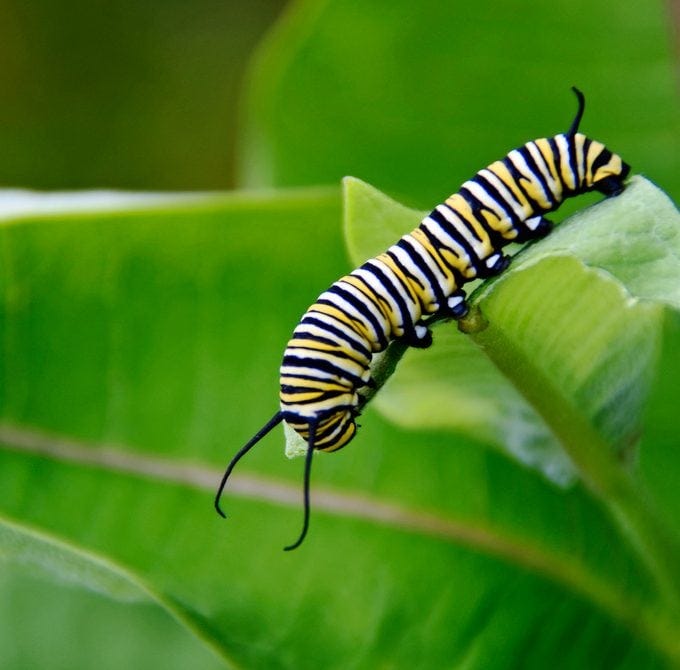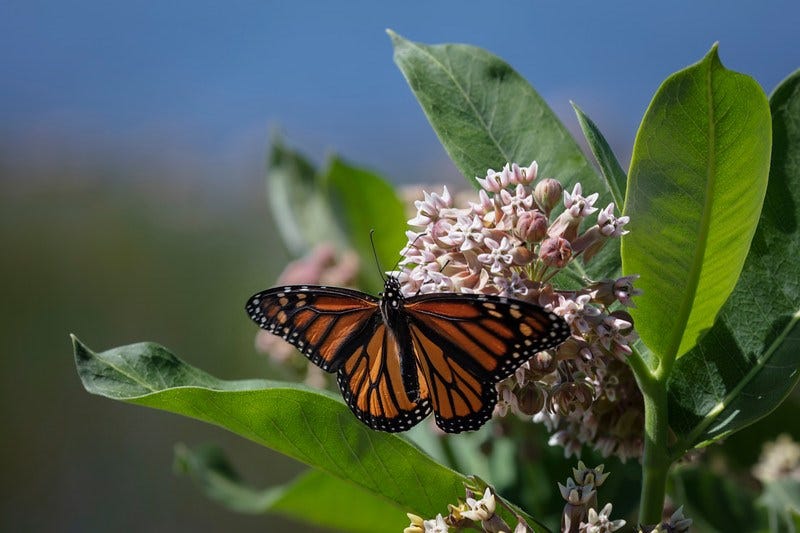The common milkweed stands tall along the roadsides and fencerows all summer, steadfast and unassuming in the ditches, the hedgerows, the border-places. To some, it is just a weed, coarse in its stalk and broad of leaf. To those with eyes to see however, it is the silent keeper of a secret, the host of a story older than any one of us, the tender of a cycle that endures without question or complaint. It is the keeper of old truths we can yet learn—old truths of what it means to be a parent.
If you were to look closely at the undersides of its leaves, you would find the light green, perfect eggs of the monarch butterfly. In time, these eggs will split open and the smallest of caterpillars will emerge, fragile, insistent, hungry. From the moment it is born, the caterpillar begins to eat the milkweed’s leaf. Bite after bite, day after day, until it has taken so much the limb bends under the absence of form. Make no mistake, however; this is not a parasitical relationship. The milkweed gives itself over without protest, giving of itself to nourish the green-life that comes next.
This is the first truth about being a parent: you must be willing to be consumed. You must accept the quiet sacrifice, the nights without sleep, the years when your energy is parceled out in small, fleeting rations to someone who cannot yet stand alone. You will watch the body you knew lose its form to exhaustion, the routines you relied on collapse. You will face your own limitations in the small hours of morning-dark, measure your temper against physical and emotional fatigue. Like the milkweed, you will let yourself be consumed because you understand that all this giving is not loss but rather a gift that will carry your child into her full, beautiful strength.
In time, the caterpillar grows robust, full of vitality, its form and function fully realized. When it has eaten its fill, it crawls to the underside of the leaf and hangs there motionless. It is hidden from the wind, sheltered from the rain, shielded from the beating summer sun. The milkweed becomes not only a place of nourishment, but shelter. Its broad leaves a rampart against the elements, a quiet place for the next transformation to begin. There in the stillness of the leaf’s under-canopy, the caterpillar begins to change, weaving the bright green chrysalis that will hold it in perfect safety. It has consumed part of the milkweed, yes, but the plant is still steadfast and sure, it is still upright and a predictable, perfect haven for the would-be butterfly.
This is the second truth about being a parent: you are called to become a refuge. In the long seasons of childhood, you must be the place of safety, the place of certainty, the place where your child can press themselves against your steady love and find the courage to grow. You shelter them not only from cold and storm but from the flood of cheap influence, the blare of voices that would strip their innocence and identity for profit. Your arms become the walls that keep out what does not belong. Your words, the quiet assurance that some things will not change. In a time when so much is unrooted, you are the root. In a culture that demands more, faster, brighter, you are the calm shelter, the enduring green pattern that is always predictable, steadfast, sure.
When the time comes, the chrysalis splits. The butterfly emerges almost immediately strong and ready. Its wings dry in the July air. Soon, it lifts from the leaf, rises into the sky, and flutter-drifts across the fields. No matter how you wish to keep it close to admire its beauty, no matter how you long for more time, there is no staying its flight. It will go where it must go. To the far coasts, to the warm valleys of California or the mountains of Mexico, to the places you cannot follow. It must. The meadows of your quiet home cannot hold the monarch; indeed, they may well stifle it. The world waits for its arrival, and the milkweed can only watch it go.
This is the third truth about being a parent: you will let go. You will stand in the quiet field of your own making and watch what you have raised take wing. It will feel impossible. It will feel as if your own heart is carried away, fragile in the wind—an impossible pain. Yet there is a promise in this leaving.
The monarch always returns.
When summer comes again, the progeny of that first butterfly will drift back to the same patch of milkweed, drawn by something older than the memory of their own short lives. They, like us, are drawn to familiar ground by blood-memory. To place. They will settle in the fields where their lineage began. They will sip the nectar, carry the pollen, complete the cycle. What was once nourished by the milkweed returns to nourish it in kind.
This is the hope you are given: the work you have done is not lost. The sacrifice, the shelter, the letting go. All of it will return in time. The children you release into the world will come back in ways you cannot predict, cannot fathom. They will remember the lessons, the tenderness, the home you made with your good hands. They will tend it in their own season, carry it forward for another generation. In this there is no final ending—there is only the slow and certain continuity of the good work, of the pattern, of things well rooted and an understanding of place.
When you pass a stand of milkweed this summer, pause a while. Look beneath the leaves. Watch the caterpillars at their quiet work. Know that you are witnessing something old and good and true. Know that every parent, like every milkweed, has been asked to give, to shelter, to let go, and to trust that what flies away will someday return.
Know that this is not a lesson of loss, but a story of continuance, of love returned in its own time and season, of an old cycle yet unbroken.
Author’s Note: Normally, these Sunday essays are for paid subscribers only. This essay however will remain free forever so that it may bring hope, joy, or solace to any parent navigating the good, green pattern.








Marvelous. Hopeful and honest.
Viewed from the liminal interval between letting go and hope of return knowledge of this cycle is sometimes your only comfort.